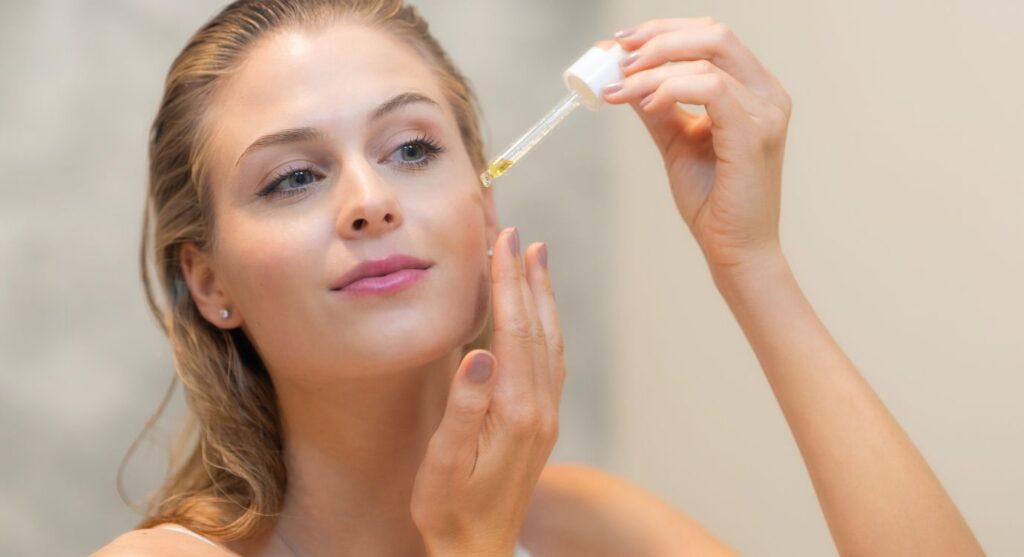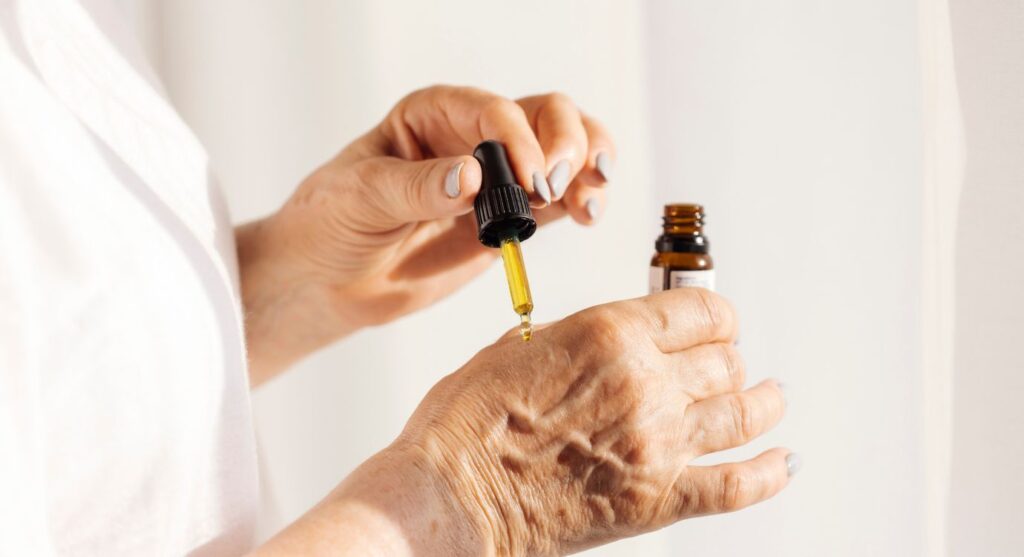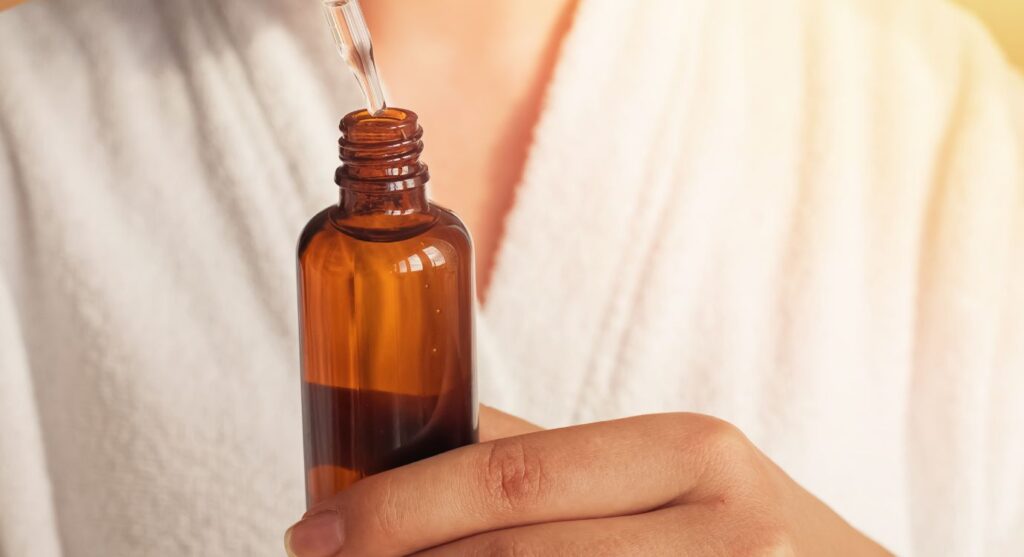Free delivery on all orders over £45
Free delivery on all orders over £45

Medically reviewed by
CBD oil is known for its many benefits for wellness, with more being discovered daily as research around this special cannabinoid grows.
CBD is currently used in the health and supplement industry, as well as in food, drinks… and now skincare, too, with research predicting that the CBD skincare market could reach $1.7 billion by 2025.
But are we just shoving CBD into our favourite moisturiser because it’s become a wellness buzzword? Are there any real benefits to integrating CBD oil into your wellness routine?
In this guide, we will cover:
If you want help with maintaining healthy skin, you may be intrigued to learn about the advantages of CBD oil for your skin…
So, let’s dive in.
Well, in truth, there’s still lots we need to learn about the therapeutic properties of CBD.
But, we know it’s to do with our body’s natural endocannabinoid system (ECS), with which the cannabinoid molecules in CBD oil interact.
Our ECS naturally inhibits illness and regulates our biological functions, helping our body maintain balance and homeostasis.
“So how is that relevant to skin?”
It’s clear that poor skin health and hormonal imbalances are the most likely cause of skin problems – no matter your age. Other contributing factors are diet and medications.
Unhealthy-looking skin can hinder confidence and cause the endocannabinoid system to stop functioning as it should.
In turn, a person may experience a change in mood, appetite, and stress. When the mind and body are involved in stressful situations, it can cause the endocannabinoid system to lack its restorative and balancing properties.
“So, how does CBD help?”
The ECS and CBD can help balance the body’s functioning. Without a balanced ECS, the skin may suffer, as well as other functions in the body.
CBD’s cannabinoid receptors can work in sync with the endocannabinoid system to help rebalance it, which explains why CBD may be able to influence the body to promote skin health.
CBD skincare is all the rage. But how does it work?
Let’s take a look:
When it comes to CBD and acne, more research is needed for any clinical conclusions to be drawn.
But initial research looks somewhat promising. Many factors can trigger acne, one being an excess of sebum – a waxy, oily substance produced by the skin.
Early research explored the effects of CBD on sebocytes – the cells that create sebum. In the 2014 study, researchers found that CBD prevented these cells from overproducing oily sebum.
The same study also found that CBD oil prevented inflammatory cytokines from activating. As it’s thought that cytokines may trigger acne, reducing them may help to prevent breakouts.
While the discussed research is promising, it should be noted that CBD isn’t in any sense a cure for acne – more a potential tool that can help promote overall skin health.
Read more: CBD oil for eczema
CBD skincare is all the rage – but can CBD smooth my wrinkles?
While it won’t give you a facelift, CBD has both antioxidative and anti-inflammatory properties, which may work to improve skin texture and health.
While CBD cannot treat skin infections, CBD oil’s anti-fungal properties may go some way towards soothing fungal infections such as athletes’ foot or jock itch.
As well as CBD, other cannabinoids found in CBD oil are also thought to have anti-fungal properties – specifically cannabigerol (CBG) and cannabichromene (CBC).
CBD oil is associated with several benefits for skin health. Here’s how CBD may help your skin.
CBD oil is full of linoleic and oleic acids – which aren’t produced by the body but have a role to play in skin health and ageing. As such, they are important nutrients to add to your diet – CBD oil can facilitate this.
CBD isn’t a miracle cure for skin conditions.
But, as mentioned above, this cannabinoid’s anti-inflammatory properties are well known – meaning it may be a useful tool in improving skin health.
Acne, eczema, and psoriasis all inflame the skin – meaning CBD may be able to act as a calming antidote.
Read more: CBD oil for psoriasis
This notion is supported by a (very small and therefore limited) study, which saw 20 participants with inflammatory skin conditions use a CBD-enriched skin ointment twice daily for three months.
Participants showed improvements – including reduced inflammation.
10% off on your first order
Complete this one-minute quiz and find the right products for you.
“Okay, I’m thinking of incorporating CBD into my skincare routine. But what’s the best option? How do I effectively use CBD oil for skin?”
Don’t worry – we’ve got you covered. Here are the three ways you can use CBD for skin care.
Yes, you can rub CBD oil directly onto your skin! Your skin has cannabinoid receptors while the pores of your skin actively absorb all the ingredients of oils.
You can also mix CBD oil with your moisturiser if you’re looking to boost hydration or combine it with sunscreen to add a nourishing element to your skin protection.
Your CBD topical cream can also be used as a moisturiser or incorporated as one element of your skincare routine. Take a pinch and massage your CBD topical cream into your face, avoiding your eyes and mouth.
Unsurprisingly, there are a plethora of specialised CBD skincare products on the market – from body lotions to bath melts.
Specialised CBD skincare products can be great, but choose reputable brands you know and trust.
Often, these products will contain very little CBD, despite marketing themselves as still benefiting from being able to market CBD as an ‘active ingredient’ in the product.

Now, we know how to use it, but how long does CBD take to work?
If you use CBD oil directly on the skin’s periphery, you may see results within an hour, as CBD reacts with the endocannabinoid system and is picked up by your skin’s cannabinoid receptors.
Alternatively, you may find that your skin health improves over a longer period of time with consistent use.
If you have a skin condition, speaking directly with a medical professional is best, as CBD shouldn’t be considered a replacement for medical treatment.
A medical professional may also be able to assist you in whether CBD oil can be mixed with your product and, if so, how much you can add.
For those who use CBD oil sublingually, any impact this may have on your skin may take much longer.
This is where the skin is an exception – usually, taking CBD under the tongue is best and offers the best bioavailability. But when using CBD oil for skin, sublingual administration will take longer to interact with your skin’s cannabinoid receptors.
However, keep in mind that Individuals react differently to CBD products, depending on their current health and medical conditions; therefore, the time it takes to work will also differ.
Read more: How long does CBD stay in your system?
CBD oil products are available in varying formulations.
So which is the best CBD oil for skin?
Here’s the lowdown:
Firstly, you can choose between three types of CBD: full-spectrum CBD oils (FSO), broad-spectrum (like our products) or CBD isolates.
Each has its own chemical structure that depends on how it is extracted and mixed with other ingredients.
Full-spectrum CBD oils contain a small amount of THC, whereas CBD isolate is the purest form that does not have any other plant compounds.
A full spectrum or broad-spectrum CBD oil is the best choice for addressing skin health as these formulations include cannabinoids, flavonoids, and terpenes other than cannabidiol – some of which have already been identified as having properties which encourage healthy skin.
Read more: How is CBD extracted?
When you purchase CBD oil for skin or any other medical concerns, you must ensure you trust the seller is legitimate.
More than 60% of CBD sellers mislabel their products in the online market, which does not verify their safety. Thus, always check the labels, lab results, and reviews.
Products that contain organic and natural ingredients will be most suitable for skin health because of their simple formulas, free from chemicals.

Is CBD a magical skin elixir?
Perhaps not. But CBD oil has proven to be highly effective for restoring overall general well-being. Therefore, with the aid of CBD oil, you may be able to restore balance to your skin.
Alongside a regular skincare routine, a balanced diet, and good lifestyle choices, CBD oil may keep the skin looking and feeling well.
Do remember that CBD isn’t an approved treatment for skin conditions – much more research needs to be done on using CBD oil for skincare. If you suffer from skin issues and are considering using CBD, always speak to a medical professional before doing so.
Sign up for the Evopure newsletter:
This product is not for use by or sale to persons under the age of 18. It should not be used if you are pregnant or nursing. Consult with a physician before use if you have a serious medical condition or use prescription medications. A Doctor’s advice should be sought before using this and any supplemental dietary product. This product is not intended to diagnose, treat, cure or prevent any disease.
© Evopure Ltd. All rights reserved Terms & Conditions Cookie Policy Sitemap